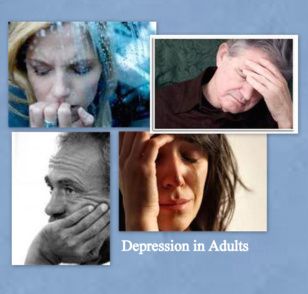
Home
About Mental Health
Depression/Disorders
Suicide
Alcohol/Drugs
Depression & the Eldery FAQ's on Depression
Medications
Adult Depression
Depression ranges in seriousness from mild, temporary episodes of sadness to severe, persistent depression. Doctors use the term "clinical depression" to describe the more severe form of depression also known as "major depression" or "major depressive disorder."
According to the American Psychiatric Association, up to 25 percent of the population will suffer from a depressive disorder during their lifespan. Although people of all ages can become depressed, some of the symptoms differ in children versus adults. The list below outlines the main symptoms of depression as they usually present in adults. Five or more symptoms must be present within a two-week period to meet the criteria for a major depressive episode. Two symptoms need be present over the course of two years to meet the criteria for dysthymic disorder.
Symptoms Checklist
Sadness
Although it may seem obvious that sadness or depressed mood is a symptom of depression, it is the pervasive nature of the sadness that differentiates this symptom from the occasional "blues." To meet diagnostic criteria, the depressed mood or sadness must persist, more often than not, on a daily basis. Tearfulness, anxiety, ruminative tendencies and feelings of worthlessness are hallmarks of this symptom and can either be self identified, or identified through the observations of others.
Disinterest
Another defining symptom of depression is the loss of interest in things that previously were fun or pleasurable. Again, the disinterest is pervasive and occurs more often than not on a daily basis. Although everyone occasionally loses interest in an activity or hobby, a depressed individual will cease to like things that are central to his life and important to overall happiness. For example, a sports fanatic might start missing Sunday football get-togethers or a parent might find it difficult to engage in a game with his child.
Low Self-esteem and Hopelessness
Individuals suffering from depression may experience feelings of worthlessness, hopelessness and excessive guilt. Moreover, many times these symptoms are directly associated to other symptoms of depression. For example, a woman with depression may feel she is no fun to be around and therefore worthless as a friend or a parent. If she loses interest in her book club, an activity she previously enjoyed, she may feel guilty about avoiding her friends and she may become anxious that her friends think she is a "flake". It is particularly important to recognize these feelings as symptoms of depression separate from the activities or behaviors they are associated with in the depressed person's mind.
Change in Sleep or Eating Habits
Depression often manifests in an overall feeling of being worn out or fatigued. Depressed individuals may have difficulty falling or staying asleep which in turn can further the depression. Over-sleeping might also be experienced in a depressed person as well as a change in eating habits. A 5 percent change in weight that occurs over the course of a month without concerted effort is a red flag
Thoughts of SuicideThoughts of Suicide
Suicidal attempts are obviously a serious sign of major depression. Any discussion of suicide, increase in risky behavior, or persistent thoughts of death are also symptoms of suicidal ideation. Passive suicidal tendencies may include behaviors such as walking haphazardly through traffic, speeding and refusing to wear a seat belt, a marked increase in drinking, drugs or smoking, or recklessness while partaking in inherently dangerous activities such as extreme sports. Other behaviors to be aware of include giving away important or valuable items, saying "goodbyes" and gathering the items needed to carry out a suicide attempt. It is important to note that while women make more suicide attempts, men are more successful. Therefore, a man is more likely to succeed on his first attempt. Any indication of suicidal thoughts or plans should be taken seriously. If you are worried about yourself or a loved one, seek emergency crisis help.
Less of Self
Emotional symptoms of depression can be roughly described as a global "less" effect. Feeling listless, restless, hopeless, helpless, powerless and worthless are major markers of a depressive disorder. The disorder causes an individual to feel "less" of himself by feeling unable to enjoy previous interests and pleasures, feeling as if everything has gone wrong and will never be right again, and feeling unable to pull himself out of the rut. According to the Mayo Clinic, experiencing overwhelming guilt, fixating on failures and blaming oneself for one's condition are also other emotional symptoms.
Withdrawal
People with depression experience disinterest in spending time with others and become socially withdrawn. They may become increasingly irritable and angry over small matters, which may in turn affect their social relationships. The NIMH states that depression causes pain for the loved ones of the person with the disorder as well as for the depressed individual. The Mayo Clinic says this state of mind also causes loss of interest and drive for sex and intimacy, which can affect a person's personal relationships a partner or spouse.
Eating Disorders Self Injury
Physical & Verbal Abuse
Sexual Abuse
LGBT Youth Bullying Cyber Bullying
On the News/In the News
About Me
Thank You
My Library
Inspirational Stories Disclaimer
For Parents
Message Boards
Email Me
Links

Daniel K. Hall-Flavin, M.D.